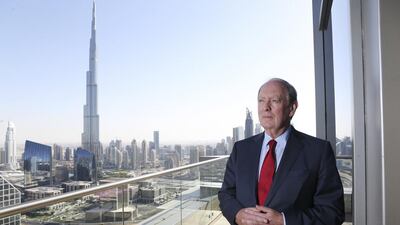Peter Felix is president of the New York-based Association of Executive Search Consultants (AESC), a global professional organisation for the retained executive search and leadership consulting industry. Mr Felix, who is stepping down from the role at the end of this month, recently visited Dubai to meet AESC members. Here, he talks about the issue of work-life balance for top executives.
Can you first explain the concept of “retained executive search” and how this differs from the practice of recruiting or headhunting?
Retained executive search consulting is considered a form of management consulting. A hiring organisation typically retains an executive search firm to help them find a new senior level employee – a chief executive, for example. The hiring organisation and the executive search firm enter into a partnership; the search firm also brings industry-specific expertise and insight to the organisation’s leadership needs. The retained search firm does not represent the individual executive but instead works for the hiring organisation to find the best possible person for a particular role. The advantage of having a retained executive company is that it gives the hiring organisation a competitive edge.
Is it an important industry in the UAE?
We estimate we have members conducting executive searches in more than 70 countries. The US and the UK are two of the most dominant markets. As you move into the emerging markets, as these start to develop, firms realise there is a shortage of talent if they want to go outside their families, grow their businesses, globalise. That’s when they realise they have to compete in the international talent market. Retained executive search really helps them find the best available talent they can. It’s a growing market in the UAE. I wouldn’t say it’s fully developed but more and more executive search firms are setting up here.
You carried out a survey that gauges how executives feel about their work-life balance. What were the highlights of the 2014 report?
The report actually found that people are increasingly happy, or happier, with their work-life balance, with 52 per cent saying they are satisfied or very satisfied. Fours year ago, only 45 per cent of executives said they were happy. One reason for this is technology: while on the one hand it makes senior executives accessible 24/7, it also liberates them from having to be in the office the whole time. When Max Shireson stepped down as chief executive of a US software company in August to spend more time with his family, he generated quite a few headlines. Why is the work-life balance issue still such a hot potato? Globalisation and the pressure on people to travel extensively have put huge pressures on senior executives. The role of the CEO today is more complex and more burdensome than it ever was, so work-life balance for senior executives does become an issue. We are also in a more open environment. In the past, if you had a good job, you didn’t complain about the fact you had to be on a plane the whole time. Today people are taking a more objective view of life and there are so many opportunities outside of corporate life today made possible by the internet. People can start an internet company and can make a lot of money by the time they are 30 or 40. Then they can say: “I’ve got enough money; what else do I want to do?” Twenty, 30 years ago very few people made large amounts of money except on Wall Street.
Mr Shireson said his wife was often asked about her work-life balance but he rarely was. Why are working women with families still asked about this more than men?
You’ve still got this hangover from the traditional roles. If you go back 20 years, certainly in the UK, many women didn’t pursue serious careers. That is changing but for many women, the question is, how do you balance the traditional role of looking after the family? It’s still a natural instinct that women will want to look after children themselves so that is where the famous multitasking comes in. Obviously the answer for a lot of senior women is extra help. And I do think technology is the great liberator: you can work away from an office; you can work from home; you don’t have to travel necessarily if you can do a video conference.
And are you seeing any trends in the ways people handle stress? What about life coaches, for example?
Definitely, that’s a big trend. There’s no question that coaching, whether it’s corporate coaches or life coaches, it’s a big business and people find it very helpful. My wife, who is a senior executive, has had the same mentor or coach for about 10 years. It’s a great release valve for her to talk to her. I’ve had career coaching myself; it’s a very valuable thing.
business@thenational.ae
Follow The National's Business section on Twitter

